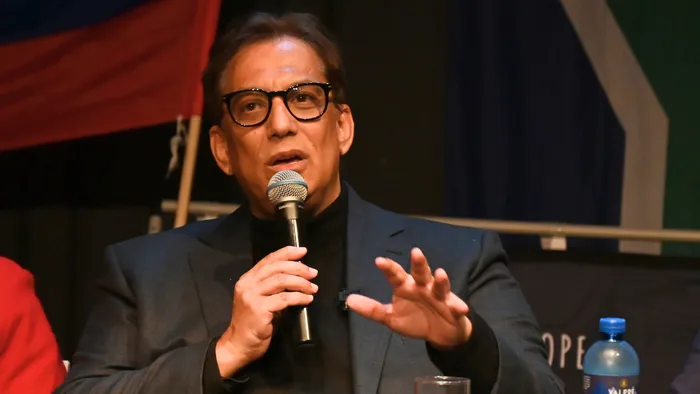Breaking Monopolies: How South Africa Can Lead in a Multipolar World

Dr Iqbal Survé delivers a keynote address at the Legacy of Hope initiative. South Africa stands at a crossroads, grappling with its identity and narrative in a world increasingly dominated by competing powers, writes Adri Senekal-de Wet.
Image: Ayanda Ndamane / Independent Newspapers
There is a quiet war being waged across the globe. Not with guns or tanks, but with ideas, influence, and narratives. At its heart lies a question that should haunt any country born of struggle: who gets to tell our story, and on whose terms?
South Africa, once a beacon of hope in a world riddled with racial injustice, stands today at a painful crossroads. Our democracy, though hard-won, has been hijacked by elite capture, economic exclusion, and the slow erasure of our liberation ideals. And in the realm of global discourse, we have surrendered our voice to the same Western machinery that once labelled our freedom fighters terrorists.
It is in this context that the message of BRICS, and particularly the recent "Legacy of Hope" initiative, must be understood. This is not merely about nostalgia or diplomatic alliances. It is about reclaiming agency in a world that is once again fragmenting along lines of power and privilege. It is about deciding whether we, the people of the Global South, will continue to be pawns, or finally become architects.
In his keynote at the recent Legacy of Hope documentary premiere, Dr. Iqbal Survé cut through the diplomatic pleasantries and exposed the ideological rot at the heart of our national condition: "You cannot live in this country today and ignore the plight of the majority. Unemployment, lack of access to healthcare and education, and hopelessness for our youth are daily realities. So the values of solidarity must be lived at home before being projected globally."
Therein lies the contradiction. While our leaders posture at international summits and praiseSouth Africa’s BRICS membership, the lived reality for most of our people remains unchanged. The unemployment crisis has reached catastrophic levels. Inequality is not merely a remnant of apartheid; it is actively being reproduced by a system that places profit over people. We are quick to invoke Mandela abroad, yet ignore his vision of justice and equality at home.
And perhaps most damningly, we have allowed ourselves to become ashamed of the very history that liberated us. Western institutions and corporate media have waged a relentless campaign to delegitimise the Global South's resistance movements, to paint BRICS as authoritarian, and to reduce calls for sovereignty to mere populism. Instead of challengingthis narrative, we accommodate it.
South Africa’s political class, in their thirst for international approval, have become fluent in the language of neoliberal appeasement. Meanwhile, the real work of transformation is abandoned. No wonder Dr. Survé, who himself played a role in the liberation movement, warned that “those of us who speak from lived experience and hold true to the values of Global South solidarity are sidelined. We are targeted and find it incredibly difficult to tell the truth—an authentic, not revisionist, history of our country.”
This is the crisis of our time: a nation born in rebellion now afraid to offend. A leadership obsessed with optics while the house burns. If we are to build a multipolar world, a world where countries like ours are not mere appendages of Western capital and military alliances—we must begin by fixing our own house.
We must build sovereign media institutions. Not as mouthpieces for the state, but as platforms for truth. As Dr. Survé noted: “We are the only media house that gives voice to the Global South. Other outlets ignore or criticise us.” That should terrify us all.
We must build an economy that rewards labour, not looting. A society that invests in young people, not punishes them for dreaming. Job creation is not a slogan—it is a revolutionary act. It is the antidote to crime, to despair, to emigration. And it is entirely possible, if we abandon the economic myths of trickle-down and reflect, go back to the Freedom Charter.
And above all, we must remember that global solidarity is not charity. It is a strategy. Cuba did not send doctors and soldiers to Angola out of pity. Russia, China, and India did not support our liberation because it was fashionable. They understood what too many of our leaders have forgotten: when one corner of the world resists, it strengthens the whole.
So the question is simple. Will South Africa continue to act like a junior partner in its own story? Or will it rise with courage, defiance, and clarity to demand a future that is ours?
The world is shifting. The West is no longer the sole centre of power. The age of unipolarityis over. What replaces it is not guaranteed. It could be a new order rooted in justice and cooperation, or it could be a battleground of competing oligarchies. The difference will be made by those willing to speak truth, regardless of the cost.
South Africa—our hope, our history, our pain—deserves more than silence. It deserves anew legacy. One built not on betrayal, but on the audacity to dream, again.
The time to choose is now.
* Adri Senekal-de Wet is the Editor-in-Chief of Independent Media.
Related Topics: